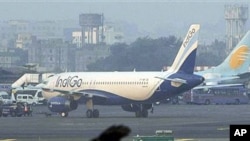The Indian aviation industry is rebounding from the financial difficulties it faced during global economic downturn. The country’s domestic carriers are expected to buy hundreds of planes in the coming years to cope with the growth in air travel.
As air passenger traffic dropped by 30 per cent in 2009, many Indian domestic carriers put expansion plans on hold and slashed staff salaries. Cash-strapped airlines even asked for a government bailout.
But in the past year, the aviation industry has recovered from the crisis triggered by the global financial downturn. As the economy returns to a high growth path, flights are again filling with passengers, and domestic carriers are posting profits.
The first concrete signal that the industry is back on its feet came in early January, when private carrier IndiGo placed a $15 billion order for 180 aircraft with Airbus. It is the largest single order of Airbus planes and is expected to be delivered between 2016 and 2025.
Besides IndiGo, other airlines also plan to buy new planes to cope with growing demand.
Aviation experts say the orders are an indication of the potential growth of the industry.
Sanat Kaul is chairman of the International Foundation for Aviation and Development in India and a former top official in the aviation ministry. He says if fares remain competitive, low-cost airlines will entice millions of rail passengers to switch to air travel.
"There are all the signs that there will be very high growth in passenger traffic,” Kaul said. “Slowly, slowly as people get addicted to flying, they will slowly and slowly not take railways for long journeys."
It is estimated that over the next 20 years India will buy 1,150 commercial jets valued at $130 billion to cater to the growing demand in the country. By that time, about 180 million passengers are expected to fly annually.
Kaul says the industry could expand hugely if airlines begin operations to smaller, so-called Tier 3 towns.
"Our growth is metro-based growth…regional growth is yet to come,” he added. “Regional growth is essentially when Tier 3 towns start using aircrafts and airlines start going there."
About a dozen domestic carriers began operations in India about a decade ago to take advantage of a booming economy, which created a huge middle class in India. Until then, India’s aviation sector was dominated by state-owned airlines.




